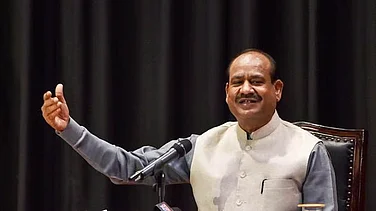Hinduism haunts Ambedkar ceaselessly. He confesses to having experienced that uncanny feeling one gets when ghosts exercise their force on the living. Still in his mid-twenties, the prodigious Ambedkar writes of being troubled by the ghost of Manu, that mystical jurist of the Hindu tradition, whose classic work Manusmriti he will publicly burn in 1927. Of course, this sacrificial gesture of destruction by fire (yajna)—whose name by now is “satyagraha” and of which Ambedkar is a temporary adherent—is itself unequivocally Hindu, perhaps even Vedic. It is almost prophetic that the young Ambedkar should write in New York in 1916, more than a decade in advance, “I may seem hard on Manu, but I am sure my force is not strong enough to kill his ghost. He lives, like a disembodied spirit and is appealed to, and I am afraid will yet live long.”
So, force, whether of religion or the law, is a living apparition. What stands out however is Ambedkar’s awareness of that religious phantasm that goes by the name of Manu: disembodied, invisible and deathless, a figure that lives on, impossible to exorcise. This spectral thinking of sacredness and authority, this consciousness of force as such, makes its first appearance in Ambedkar’s Masters thesis at Columbia University. Within it is arranged the young Ambedkar’s formidable ethical and political itinerary that is still to come. The strange possession by spirit in New York perhaps also explains why it is not Ambedkar’s favourite Edmund Burke, whose Reflections on the Revolution in France appears in Ambedkar’s corpus somewhat later, but instead William Shakespeare’s Macbeth that establishes the young Ambedkar’s moral and political procedures.
At the end of the opening section of his thesis, after having detailed the corrupt procedures of the East India Company’s Court of Directors by which the Company has come to secure its political sovereignty over India, Ambedkar comes up with this exemplary theatrical allegory. “The last chapter must have made it clear how and why Western Europe was at a death grapple for the control of India. We followed the armies of the different leaders of different nations—fighting for a country the people of which had very little to choose in the final destiny—the Cama, the Albuquerques, the Busseys, the Lallys, the Clives, the Malcolms, the lakes and the shores as though enacting the train of ghosts of Banquo’s line all that terrified Shakespeare’s Macbeth out of his senses.” This is an intriguing formulation and for someone like Ambedkar who is the master of pithy prose, exemplary for the conjuring gesture it makes. This might be, in fact, another Ambedkar altogether, whose own conceptual and mystical rhythm we must now, more than ever, follow with care.
For, Ambedkar’s early resort to Shakespeare marks not merely his formidable rhetorical resources. Instead, his frequent resort to theatre over four decades exemplifies his ability to see moral and political force as constitutively braided with the mystical history of representation. It exemplifies his ability to apprehend imperial and religious violence as founded in the economy of aura and luminosity. It exemplifies, above all, his suspicion of the very concept of representation, including his suspicion of parliamentary democracy itself. Ambedkar will never let go of democracy, nor will he ever renounce religion as such. But he will never forget that the worst violence, the violence that always returns in the alliance between religion and democracy, occurs precisely when they promise to keep life safe and sacred.
Of course, there is a distinctive history of this suspicion; a long genealogy of this Shudra-Shakespearean willingness to see religion as a scene whose staged aura corrupts life at its very source. For, Ambedkar’s militant master Jyotirao Govindrao Phule too will have seen at work in the modern colonised Brahmin the grey shades of Shakespeare’s Othello. “The Brahmin of the present time,” Phule writes in Gulamgiri, “finds to some extent, like Othello, that his occupation is gone. But knowing full well this state of matters, is the Brahmin inclined to make atonement for his past selfishness?” It’s as if Ambedkar, in invoking Macbeth half a century later, is answering the master’s Shakespearean question. Note his pointed accent on the people who had “very little to choose in the final destiny”. These are the multitude that have had little choice and have been rendered mook. Devoid of speech and representation, they are spoken for only by ventriloquists, by conjurers of divinity whose own authority lies shrouded in religious secrecy. If the long line of European conquerors chases the dream of domination over India, the Brahmin ventriloquists who claim to speak for India do not resist. Instead, they look away, hiding behind their own gods and spirits, scared as they are, like Macbeth, “out of their senses”. Macbeth always knew that the guilt lay with him. Deep down, he knew of the evil and violence he harboured within himself. And the Empire, like Banquo’s apparition, is the reminder of that guilt: the violence at the very source of religion, the corruption at the very heart of Hinduism, that has now returned to haunt the Macbeth-like Brahmins.
As if Shakespeare, read in haste, has prepared Ambedkar for ghosts, as if Empire and Manusmriti share some duplicitous force, as if their auras are derived from the same source, as if they are merely ghosts of one another that must be exorcised together. For, barely a year later, still in New York, Ambedkar turns his gaze to the sovereign figure of Indic jurisprudence. Invoking chaturvarnya and its ghostly author, he announces, “I first propose to handle the law-giver of India. Every country has its law-giver, who arises as an incarnation (avatar) in times of emergency to set right a sinning humanity and give it the laws of justice and morality. Manu, the lawgiver of India, if he did exist, was certainly an audacious person.”
It is three months after Ambedkar’s essay is published that Gandhi—unaware of this corpus taking form in New York—speaks of the Shudra’s disarmament as the very foundation of ahimsa. “Everyone cannot bear arms here,” he says, curiously instituting Shudradharma as the ethical ground of satyagraha. Where Ambedkar insists on handling the ghost of Manu—and handling, touching, wielding, manual strength, the hand as such are not here merely metaphors for the untouchable, they are also questions of ability and right—Gandhi perversely hinges the very possibility of ahimsaic civility on the historic amputation of the Shudra’s hand.
For Ambedkar, Gandhi’s ahimsa, founded on the forced demilitarisation of the unequal, is not non-violent enough. It doesn’t give love; it instead merely regulates sacrifice in the name of epochal duty (Yugadharma). In the decades to come, Ambedkar’s task will be impossible: the task not merely of the annihilation (ucched) of chaturvarnya, but the task instead of thinking up another civility (vinaya) in the midst of that annihilation, the task of annihilation as ahimsa. In 1940, he will, intriguingly, term this task the “love of politics”. Clearly, a political love, a democratic love of hands, numbers, and counting, demands not only civility but also force—militancy even. As Ambedkar affirms some months before his death, “Ahimsa does not say ‘Don’t Kill’. It only says ‘Love all’.” A very paradoxical and sacrificial love then, an ahimsa still to come, yet one that Ambedkar presses on us more urgently than ever.
Aishwary Kumar is assistant professor of intellectual history and political theory at Stanford University in California, USA


















.png?w=200&auto=format%2Ccompress&fit=max)







